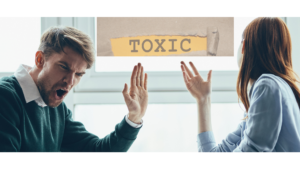
When we fall in love, we often believe it to be the greatest feeling in the world. We get swept up in the euphoria of it all, and we imagine that we will be happy forever. Unfortunately, this is not always the case. Sometimes, we find ourselves in relationships that are toxic, destructive, and unhealthy. These relationships can drain us emotionally, physically, and mentally. But how do we know if we are in a toxic romantic relationship? And what can we do to protect ourselves if we are? In this blog post, we will explore the key indicators of a toxic romantic relationship and strategies to protect ourselves from it. Here are 4 key indicators that signal you maybe getting into a toxic romantic relationship.
Lack of trust. Trust is the foundation of any healthy relationship. Without trust, there can be no intimacy, no vulnerability, and no real connection. In a toxic relationship, one or both partners may have trust issues that prevent them from being open and honest with each other. They may be suspicious of each other’s actions or intentions, and this can lead to jealousy, possessiveness, and control. If you find yourself constantly questioning your partner’s actions, motives, and feelings, or if your partner is constantly questioning yours, it may be a sign that your relationship is toxic.
Lack of respect. Respect is an essential ingredient in any healthy relationship. It means treating your partner with kindness, consideration, and dignity. In a toxic relationship, one or both partners may lack respect for each other. They may belittle each other, put each other down, or criticize each other’s every move. They may dismiss each other’s feelings or ignore each other’s needs. If you feel like you are constantly being disrespected in your relationship, or if you find yourself disrespecting your partner, it may be a sign that your relationship is toxic.
Lack of communication. Communication is the glue that holds relationships together. It means expressing your thoughts, feelings, and needs in a clear and respectful way. In a toxic relationship, one or both partners may struggle with communication. They may avoid difficult conversations, bottle up their emotions, or resort to yelling and screaming when they do communicate. They may also give each other the silent treatment or refuse to listen to each other’s point of view. If you find yourself struggling to communicate with your partner, or if your partner refuses to communicate with you, it may be a sign that your relationship is toxic.
Lack of boundaries. Boundaries are essential in any healthy relationship. They mean knowing your limits and communicating them to your partner. In a toxic relationship, one or both partners may have poor boundaries. They may violate each other’s personal space, invade each other’s privacy, or manipulate each other’s emotions. They may also be unable to say “no” to each other, or they may be unable to respect each other’s boundaries when they do say “no.” If you find yourself feeling violated or manipulated in your relationship, or if you find yourself violating or manipulating your partner, it may be a sign that your relationship is toxic.
So, what can you do if you are in a toxic romantic relationship? Here are 5 steps to protect yourself if the answer is Yes.
Recognize that you are in a toxic relationship. This can be difficult, especially if you have been in the relationship for a long time, or if you have convinced yourself that things will get better. But recognizing that you are in a toxic relationship is the first step to protecting yourself from it.
Set clear boundaries. This means knowing your limits and communicating them to your partner. It also means respecting your partner’s boundaries and being willing to compromise when necessary. Setting boundaries can be difficult, but it is essential to protect yourself in a toxic relationship. You must be clear about what you will and will not tolerate in your relationship. You must be willing to say “no” when your partner crosses a boundary, and you must be willing to enforce those boundaries if your partner continues to violate them. Remember, setting boundaries is not about punishing your partner or controlling them. It is about taking care of yourself and creating a healthy and safe relationship.
Seek support. It can be challenging to navigate a toxic relationship on your own. You may feel isolated, ashamed, or embarrassed about your situation. But remember, you are not alone. There are many people who can support you, including friends, family, therapists, and support groups. Reach out to those who care about you and who want to see you happy and healthy. They can help you navigate the challenges of a toxic relationship and provide you with the support and encouragement you need to protect yourself.
Prioritize self-care. When you are in a toxic relationship, it can be easy to neglect your own needs and prioritize your partner’s needs instead. But this is a recipe for disaster. To protect yourself from a toxic relationship, you must prioritize your own well-being. This means taking care of your physical health by eating well, getting enough sleep, and exercising regularly. It also means taking care of your emotional health by practicing self-care activities like meditation, journaling, or therapy. Remember, you cannot pour from an empty cup. Take care of yourself first so that you can be there for yourself and your loved ones.
Consider ending the relationship. This can be a difficult decision to make, but sometimes it is necessary to protect yourself from a toxic relationship. If your partner is unwilling to change their behavior or if the relationship is causing you harm, it may be time to move on. Remember, ending a relationship does not mean you have failed or that you are not worthy of love. It means that you value yourself enough to prioritize your own well-being and happiness.
Toxic romantic relationship can be emotionally, physically, and mentally draining. But by recognizing the key indicators of a toxic relationship and implementing strategies to protect yourself, you can navigate the challenges and prioritize your own well-being. Remember, you are worthy of love and respect. Don’t settle for anything less. If you need help reach out.

